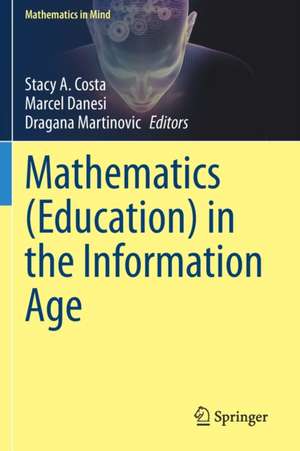Mathematics (Education) in the Information Age: Mathematics in Mind
Editat de Stacy A. Costa, Marcel Danesi, Dragana Martinovicen Limba Engleză Paperback – 12 dec 2021
| Toate formatele și edițiile | Preț | Express |
|---|---|---|
| Paperback (1) | 384.86 lei 6-8 săpt. | |
| Springer International Publishing – 12 dec 2021 | 384.86 lei 6-8 săpt. | |
| Hardback (1) | 392.21 lei 6-8 săpt. | |
| Springer International Publishing – 11 dec 2020 | 392.21 lei 6-8 săpt. |
Preț: 384.86 lei
Nou
Puncte Express: 577
Preț estimativ în valută:
73.64€ • 77.10$ • 60.93£
73.64€ • 77.10$ • 60.93£
Carte tipărită la comandă
Livrare economică 05-19 aprilie
Preluare comenzi: 021 569.72.76
Specificații
ISBN-13: 9783030591793
ISBN-10: 3030591794
Pagini: 226
Ilustrații: X, 226 p. 71 illus., 8 illus. in color.
Dimensiuni: 155 x 235 mm
Greutate: 0.34 kg
Ediția:1st ed. 2020
Editura: Springer International Publishing
Colecția Springer
Seria Mathematics in Mind
Locul publicării:Cham, Switzerland
ISBN-10: 3030591794
Pagini: 226
Ilustrații: X, 226 p. 71 illus., 8 illus. in color.
Dimensiuni: 155 x 235 mm
Greutate: 0.34 kg
Ediția:1st ed. 2020
Editura: Springer International Publishing
Colecția Springer
Seria Mathematics in Mind
Locul publicării:Cham, Switzerland
Cuprins
1. The Information Age, Mathematics, and Mathematics Education (S. Costa, M. Danesi, D. Martinovic).- 2. An Unsupervised Approach to User Characterization in Online Learning and Social Platforms (D. Vilenchik).- 3. Argumentation is Elementary: The Case for Teaching Argumentation in Elementary Mathematics Classrooms (K. Marks Krpan, G. Shambu).- 4. Subverting Stereotypes: Visual Rhetoric in the #SheCanSTEM Campaign (D. Danuser).- 5, Graphical Literacy, Graphicacy, and STEM Subjects (S. Costa).- 6. Mathematics, Statistics, and Sports (F. Nuessel).- 7. Travels with Epsilon in Sign and Space (L.H. Kauffman).- 8. Experimental Mathematics: Overview and Pedagogical Implications (M. Danesi).- 9. Why the Basics Still Matter: The Cost of Using a Machine to Do Mathematics (S. Gollish).- 10. Syntonic Appropriation for Growth in Mathematical Understanding: An Argument for Curated Robotics Experiences (K. Francis, S. Khan).- 11. Why Do Mathematicians Need Diagrams? Peirce's Existential Graphs and the Idea of Immanent Visuality (V. Kiryushenko).- 12. Procedural Steps, Conceptual Steps, and Critical Discernments: A Necessary Evolution of School Mathematics in the Information Age (M. Metz, B. Davis).- 13. If One Can Read and Write Then One Can Also Do Mathematics (R.K. Logan).
Recenzii
“The book is a perfect blend of academic, social, technological and pedagogical discussions. Each chapter ends with references for further reading. … the book is an excellent addition to the existing mathematics education literature. The very first reading of the book makes one admire both the content of the book and the way it is structured and edited. The lucid style of writing adopted by the authors makes the book readily accessible.” (Firdous Ahmad Mala, Educational Studies in Mathematics, Vol. 112 (1), 2023)
“Each chapter provides a wealth of information with deep insight on how mathematics education and 21st-century teaching of mathematics to our students is quite different than even 10-20 years ago. … I highly recommend this book to anyone who wants to gain a robust and well-rounded experience in teaching the next generation in the Information Age.” (Peter Olszewski, MAA Reviews, August 13, 2021)
Textul de pe ultima copertă
This book brings together ideas from experts in cognitive science, mathematics, and mathematics education to discuss these issues and to present research on how mathematics and its learning and teaching are evolving in the Information Age. Given the ever-broadening trends in Artificial Intelligence and the processing of information generally, the aim is to assess their implications for how math is evolving and how math should now be taught to a generation that has been reared in the Information Age. It will also look at the ever-spreading assumption that human intelligence may not be unique—an idea that dovetails with current philosophies of mind such as posthumanism and transhumanism. The role of technology in human evolution has become critical in the contemporary world. Therefore, a subgoal of this book is to illuminate how humans now use their sophisticated technologies to chart cognitive and social progress.
Given the interdisciplinary nature of the chapters, this will be of interest to all kinds of readers, from mathematicians themselves working increasingly with computer scientists, to cognitive scientists who carry out research on mathematics cognition and teachers of mathematics in a classroom.
Caracteristici
Contains contributions by experts in the fields of cognitive science, mathematics, and mathematics education Deals with theoretical issues in mathematics and its connection to artifical intelligence and other new technologies Explores aspects of mathematics education in an ever-changing age shaped by technology Looks at how mathematical proofs are changing with the aid of AI












